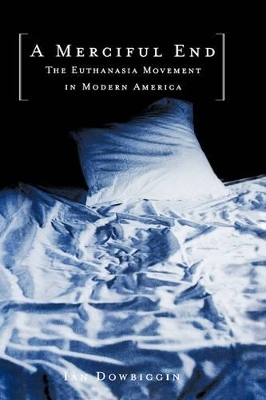
A Merciful End
The Euthanasia Movement in Modern America
Seiten
2003
Oxford University Press Inc (Verlag)
978-0-19-515443-6 (ISBN)
Oxford University Press Inc (Verlag)
978-0-19-515443-6 (ISBN)
Tells the story of those reformers who struggled throughout the twentieth century to change America's attitude towards mercy killing and assisted suicide. This work reveals that euthanasia has been a contentious issue in America for over a century. It is an account of the tension between motives and methods within twentieth century social reform.
How did today's debate over euthanasia (taken from the Greek word for 'good death') become so divisive in American society? In A Merciful End Ian Dowbiggin tells, for the first time, the dramatic story of those reformers who struggled throughout the twentieth century to change the nation's attitudes towards mercy killing and assisted suicide.
Having had access to confidential records in the United States, England and Canada, and having interviewed leading figures in the American euthanasia movement, he reveals that euthanasia has been a contentious issue in America for over a century, long before Jack Kevorkian began helping patients to die. Over the course of the twentieth century, a group of public-spirited men and women tried to break down ancient Judeo-Christian prohibitions against mercy killing, overturn state laws criminalizing assisted suicide, and convince the US Supreme Court that there is a right to die in the Constitution. In their eagerness to succeed, these euthanasia advocates have often sanctioned public policies that blur the fine line between choice and duty, freedom and coercion, the rights of the individual and the needs of society. By the dawn of the twenty-first century, they had won some small victories, and the debate over whose lives were worth living still raged, but Dowbiggin argues that more and more Americans seemed to prefer better end-of-life care to sweeping changes in laws about euthanasia. America's euthanasia movement entered the twenty-first century ready and willing to fight new wars but facing an uphill battle against sentiments such as these.
Original, wide-ranging in scope, but sensitive to the personal dimensions of euthanasia, A Merciful End is an illuminating and cautionary account of the tension between motives and methods within twentieth century social reform. It provides a refreshingly new perspective on an old debate.
How did today's debate over euthanasia (taken from the Greek word for 'good death') become so divisive in American society? In A Merciful End Ian Dowbiggin tells, for the first time, the dramatic story of those reformers who struggled throughout the twentieth century to change the nation's attitudes towards mercy killing and assisted suicide.
Having had access to confidential records in the United States, England and Canada, and having interviewed leading figures in the American euthanasia movement, he reveals that euthanasia has been a contentious issue in America for over a century, long before Jack Kevorkian began helping patients to die. Over the course of the twentieth century, a group of public-spirited men and women tried to break down ancient Judeo-Christian prohibitions against mercy killing, overturn state laws criminalizing assisted suicide, and convince the US Supreme Court that there is a right to die in the Constitution. In their eagerness to succeed, these euthanasia advocates have often sanctioned public policies that blur the fine line between choice and duty, freedom and coercion, the rights of the individual and the needs of society. By the dawn of the twenty-first century, they had won some small victories, and the debate over whose lives were worth living still raged, but Dowbiggin argues that more and more Americans seemed to prefer better end-of-life care to sweeping changes in laws about euthanasia. America's euthanasia movement entered the twenty-first century ready and willing to fight new wars but facing an uphill battle against sentiments such as these.
Original, wide-ranging in scope, but sensitive to the personal dimensions of euthanasia, A Merciful End is an illuminating and cautionary account of the tension between motives and methods within twentieth century social reform. It provides a refreshingly new perspective on an old debate.
Ian Dowbiggin is Professor of History at the University of Prince Edward Island.
Introduction ; 1. Origins ; 2. Breakthrough, 1920-1940 ; 3. Stalemate, 1940-1960 ; 4. Riding a Great Wave, 1960-1975 ; 5. Not that Simple, 1975-1990 ; Conclusion: The 1990's and beyond
| Erscheint lt. Verlag | 1.2.2003 |
|---|---|
| Verlagsort | New York |
| Sprache | englisch |
| Maße | 248 x 166 mm |
| Gewicht | 581 g |
| Themenwelt | Medizin / Pharmazie ► Gesundheitswesen |
| Medizin / Pharmazie ► Medizinische Fachgebiete ► Medizinethik | |
| Studium ► Querschnittsbereiche ► Geschichte / Ethik der Medizin | |
| Sozialwissenschaften ► Soziologie | |
| ISBN-10 | 0-19-515443-6 / 0195154436 |
| ISBN-13 | 978-0-19-515443-6 / 9780195154436 |
| Zustand | Neuware |
| Haben Sie eine Frage zum Produkt? |
Mehr entdecken
aus dem Bereich
aus dem Bereich
Die Geschichte eines Weltzentrums der Medizin von 1710 bis zur …
Buch | Softcover (2021)
Lehmanns Media (Verlag)
CHF 27,90
von der Antike bis zur Gegenwart
Buch | Softcover (2024)
C.H.Beck (Verlag)
CHF 16,80
Krankheitslehren, Irrwege, Behandlungsformen
Buch | Softcover (2024)
C.H.Beck (Verlag)
CHF 55,90


